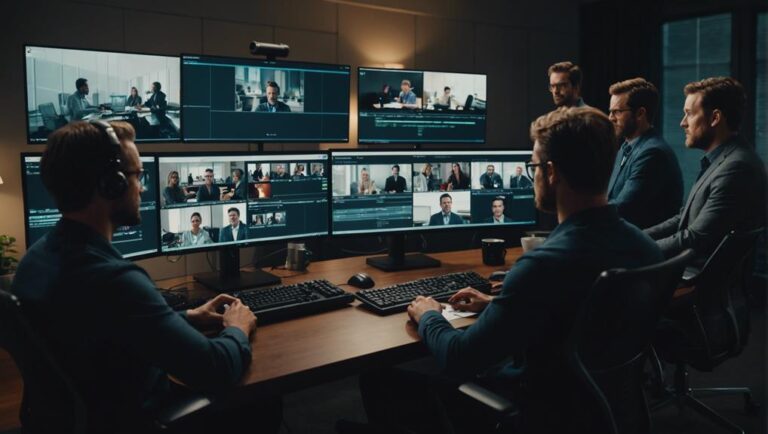Balancing Autonomy and Accountability in Remote Work Culture
In remote work settings, balancing autonomy and accountability is crucial. Granting autonomy empowers employees to excel independently, boosting productivity and trust. Clear expectations set the stage for effective communication and goal attainment. Encouraging self-discipline cultivates responsibility and time management skills. Regular check-ins and feedback sessions uphold accountability and nurture team cohesion. Leveraging technology for tracking tasks improves transparency while respecting privacy boundaries. Enhancing communication channels fosters collaboration and trust. Embracing shared responsibilities boosts team synergy and productivity. Mastering this balance ensures a harmonious and efficient remote work culture.
Importance of Autonomy
Embracing autonomy fosters individual growth and enhances productivity within a remote work setting. By empowering employees to make decisions and manage their own schedules, trust is built between the team and management. This trust is fundamental in remote work scenarios where physical oversight is limited.
Providing flexibility in how tasks are approached allows employees to tailor their work methods to suit their strengths, ultimately leading to a productivity boost.
Empowering employees with autonomy shows that you trust them to complete their tasks efficiently and effectively. This trust fosters a sense of ownership and responsibility among team members, leading to a more engaged workforce. When individuals feel trusted to manage their workload independently, they're more likely to take initiative and demonstrate accountability for their work.
Incorporating autonomy into the remote work culture not only enhances productivity but also nurtures a sense of empowerment and accomplishment among employees. Trust building through autonomy sets the foundation for a successful and cohesive remote team.
Establishing Clear Expectations
Setting clear expectations is essential for effective communication and goal alignment in a remote work environment. When working remotely, it's important to establish boundaries and communicate them clearly to your team members. Clearly defining work hours, availability, and response times helps set expectations and fosters trust among team members. By outlining specific deliverables, deadlines, and communication channels, you provide a roadmap for success and guarantee everyone is on the same page.
Setting boundaries also includes clarifying roles and responsibilities within the team. When each team member knows what's expected of them and how their work contributes to the overall goals, it promotes accountability and prevents misunderstandings. Additionally, clearly communicating priorities and any changes in project scope or direction helps everyone stay focused and aligned.
Fostering trust through transparent communication and consistent follow-through on commitments is key to successful remote work collaborations. When expectations are well-defined and understood by all team members, it leads to smoother workflows, increased productivity, and a stronger sense of teamwork.
Encouraging Self-Discipline
To cultivate a productive remote work culture, fostering self-discipline among team members is vital. Encouraging self-discipline not only enhances individual productivity but also contributes to the overall success of the team.
Personal growth is closely linked to self-discipline, as it requires individuals to push themselves to achieve their goals consistently. By developing strong self-discipline, team members can enhance their time management skills, leading to improved efficiency and effectiveness in completing tasks.
Self-discipline plays an important role in remote work environments where autonomy is prominent. Without the traditional structures found in physical offices, team members must rely on their own self-discipline to stay focused and organized. By promoting self-discipline, team leaders can empower individuals to take ownership of their work responsibilities and aim for continuous personal growth.
Effective time management is another key benefit of fostering self-discipline. Team members who practice self-discipline are better equipped to prioritize tasks, set achievable goals, and meet deadlines consistently. This not only benefits individual performance but also contributes to the overall success of the remote team.
Regular Check-ins and Feedback
Implementing regular check-ins and providing constructive feedback are essential components of maintaining accountability and fostering communication within remote work teams. Feedback sessions offer valuable opportunities to discuss individual and team progress, address challenges, and set goals for improvement. These sessions should be structured, focusing on both achievements and areas needing development. Progress reports can be shared during these meetings to track performance against objectives and provide clarity on expectations.
In addition to formal feedback sessions, informal touchpoints like virtual coffee chats can help build team camaraderie and open lines of communication. These casual interactions allow for more personal discussions and create a supportive team environment.
Team surveys can also be a useful tool to gather feedback anonymously and gauge overall team satisfaction and engagement levels.
Leveraging Technology for Tracking
Regular check-ins and feedback provide valuable insights into team progress and performance, creating a foundation for effectively leveraging technology for tracking in remote work environments.
In today's remote workforce landscape, where physical oversight is limited, technology plays an essential role in monitoring productivity and ensuring accountability. However, the implementation of such tools raises important considerations surrounding privacy concerns and employee monitoring.
Productivity tracking software, for instance, offers real-time visibility into tasks and projects, allowing managers to assess individual and team performance objectively. While this can enhance accountability and transparency, it also brings forth privacy concerns regarding the extent to which employers can monitor their remote workers.
Striking a balance between leveraging technology for tracking purposes and respecting employee privacy is paramount in maintaining a healthy remote work culture.
Celebrating Individual Achievements
Utilizing a system of recognition and rewards can effectively foster a culture of celebrating individual achievements in a remote work setting. Recognition plays an essential role in acknowledging the efforts and accomplishments of remote employees. By implementing a structured reward system, you not only motivate individuals to excel but also create a sense of appreciation within the team.
Whether it's through virtual shoutouts during team meetings, personalized thank-you notes, or virtual celebrations, recognizing individual achievements helps boost morale and engagement. Rewards act as tangible symbols of appreciation and can range from gift cards, extra time off, or even professional development opportunities. These incentives not only validate the hard work put in by remote employees but also encourage a sense of healthy competition that drives productivity.
Celebrating individual successes contributes to team building by fostering a culture of support and camaraderie. In a remote work environment, where face-to-face interactions are limited, acknowledging and celebrating individual achievements can go a long way in creating a cohesive and motivated team.
Promoting Team Collaboration
To promote team collaboration, enhancing communication channels and encouraging shared responsibilities are crucial. By facilitating open lines of communication, teams can coordinate effectively and foster a collaborative environment.
Encouraging shared responsibilities guarantees that each team member contributes to the collective goals, leading to increased productivity and synergy.
Enhancing Communication Channels
By fostering open lines of communication and embracing collaborative tools, remote teams can effectively enhance their interaction and productivity. Virtual team building activities play an important role in bridging the physical gap between team members, fostering a sense of unity and camaraderie.
These activities can include virtual team lunches, online games, or team challenges that promote collaboration and strengthen relationships.
Digital transparency is another key aspect of enhancing communication channels within remote teams. Providing visibility into project timelines, progress updates, and decision-making processes through digital platforms guarantees that team members are well-informed and aligned. This transparency fosters trust among team members and promotes accountability within the team.
Utilizing communication tools such as video conferencing, instant messaging, and project management platforms can further streamline communication processes and facilitate real-time interactions. Encouraging active participation in virtual meetings and creating designated channels for different projects or topics can also enhance collaboration and ensure that information flows effectively within the team.
Encouraging Shared Responsibilities
Encouraging shared responsibilities among team members is key to promoting collaboration and fostering a sense of collective accountability in remote work settings. Adopting a collaborative approach where team members share tasks and work towards common goals can greatly enhance team synergy. By distributing responsibilities evenly, team members not only feel more engaged in the work but also develop a deeper understanding of each other's roles and contributions.
This shared accountability creates a culture where individuals support one another, leading to increased productivity and a stronger sense of unity within the team.
To promote shared responsibilities effectively, it's essential to establish clear communication channels and set transparent expectations regarding each team member's role in the collaborative process. Regular check-ins, virtual meetings, and collaborative project management tools can facilitate the distribution of tasks and ensure that everyone is aligned towards the same objectives.
Additionally, providing opportunities for team members to offer their expertise and support to one another fosters a culture of mutual trust and respect, ultimately driving the team towards success in remote work environments.
Conclusion
In summary, finding the right balance between autonomy and accountability in remote work culture is essential for success.
By establishing clear expectations, encouraging self-discipline, and leveraging technology for tracking progress, you can create a productive and efficient remote work environment.
Remember, celebrating individual achievements and promoting team collaboration are key components to maintaining a healthy work culture.
So, keep up the good work and continue to aim for excellence in your remote work endeavors.







